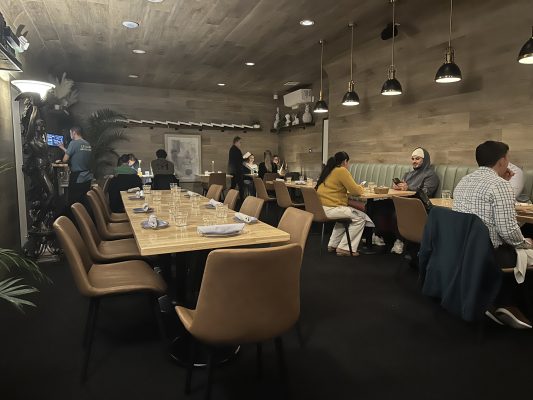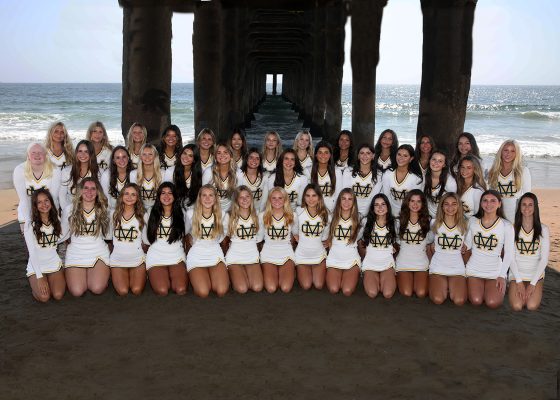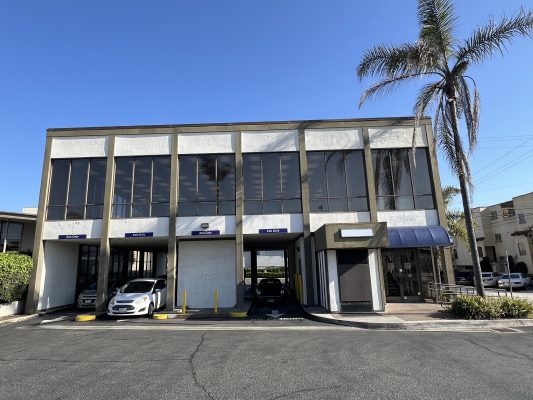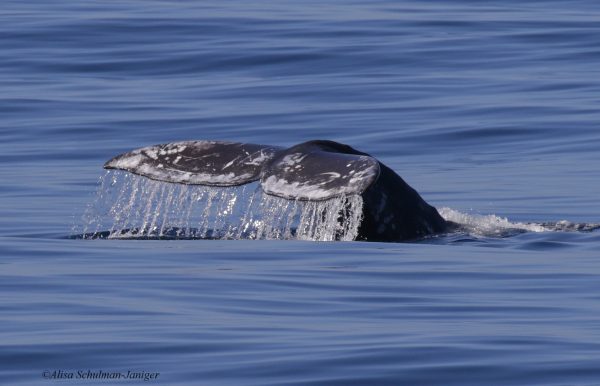
Early in the summer of 2003, an early-70s model champagne-colored Cadillac convertible pulled into El Porto with a bushy-haired big kid at the wheel. He had a tattoo on his right shoulder: four dancing skeletons, each twirling a basketball. It represented him and his three brothers and his family’s values, which were based equal parts on the wisdom of the Grateful Dead’s Jerry Garcia and former UCLA basketball Coach John Wooden.
Luke Walton had come to play. He’d been chosen by the Los Angeles Lakers as the 32nd pick in that year’s NBA draft after completing his collegiate career with the Arizona Wildcats. Technically, this meant his contract was non-guaranteed. Second round picks often don’t make it in the NBA. But Walton’s arrival felt different.
This wasn’t just because the 6-foot-8 Walton was one of the most deft passing big men in Pac-12 conference history – the only big man, in fact, to ever lead the conference in assists, averaging 6.3 as a junior – and passing was a skill particularly valued among forwards in then Lakers Coach Phil Jackson’s famed “triangle” offense. Nor was it just because of Walton’s stellar basketball pedigree as the son of one of the great centers of all time, Bill Walton, or the fact that growing up Walton meant being named after his father’s Portland Trailblazer teammate Maurice Lucas, playing pickup games with Larry Bird, and finding notes in his lunchbox imparting the life-as-basketball lessons that Wooden had so impressed upon his father three decades earlier.
It was all of these things, but also much more. When Walton pulled his Cadillac – a hand-me-down from his oldest brother that suited his easy-going, living-large personality – into Manhattan Beach that September and moved into an apartment on the beach, everything about the Lakers’ new arrival seemed in concordance. Luke seemed like the right man at the right place at the right time.
Sitting on a raggedy couch on his back deck a few weeks later, Walton surveyed the beach and thought back to the moment he was chosen on draft day.
“LA,” he said, a smile creeping across his face. “You just can’t beat it.”
That feeling is in the air again. The Lakers late last Friday announced Walton’s hire as the 26th coach in franchise history. It was a surprisingly quick courtship. The Lakers had fired head coach Byron Scott five days earlier. Walton, currently an assistant coach with the Golden State Warriors, was the only candidate interviewed. The interview occurred last Thursday afternoon in Oakland, where Lakers president Jim Buss and general manager Mitch Kupchak had traveled to meet with Walton as the Warriors prepared for the the second round of the playoffs. All other scheduled interviews were subsequently cancelled.

Kupchak issued an exultant statement Friday.
“We’re excited to bring Luke back to Los Angeles, where we feel he’s going to start an outstanding coaching career,” said Kupchak. “He’s one of the brightest young coaching minds in the game and we feel fortunate that he’ll be leading the on-court future of our team.”
Friends of Walton said that his intention had been to stay at Golden State a couple more seasons, and he likely would have done so if it had not been the Lakers who’d come calling.
“I loved everything about my time at Golden State and learning from [Coach] Steve (Kerr),” Walton told ESPN. “I’ll forever be grateful to him, the organization and the team. But I have always dreamed of being a head coach and the chance to do that for an organization like the Lakers doesn’t come around very often.”
Walton, 36, played ten seasons in the NBA, nine with the Lakers. He won championships with the Lakers in 2009 and 2010.
Chris McGee, the Lakers studio anchor on Time Warner SportsNet and a longtime friend of Walton’s, said that many in the Lakers family are wistful about Byron Scott’s dismissal. As longtime Laker trainer Gary Vitti noted, “Byron fell on his sword for this organization.” But the feeling is also prevalent that Walton is exactly the right man at the right time for the job of leading the Lakers back to NBA prominence.
McGee noted that Walton has the unusual capacity to be both “one of the guys” and a leader.
“And that is what makes him so attractive as a coach — he can talk to anybody,” McGee said. “That is why Mitch and Jim cancelled all the other appointments — this was their guy. Byron is a friend, and it’s such a bummer, because I know it was a dream job for both of them. But Luke is also one of my boys, and he’s going to be a great head coach. I’ve known him for 10 years, and he’s going to change the culture of this organization and get things going, energetically, in a positive way. That’s what this franchise needs, and that’s not a knock on Byron, at all.”
Walton’s hiring comes on the heels of the Lakers’ worst season ever, but one that potentially earned the team a top pick in a draft most observers feel contains two superstars-in-waiting: Louisiana State’s Ben Simmons and Duke’s Brandon Ingram. They also possess salary cap room that could allow the team to sign a maximum-level free agent, and are expected to heavily pursue Oklahoma City’s Kevin Durant, an unrestricted free agent.
Walton is currently in his second season as an assistant coach with the Warriors. Earlier this season, he posted a 39-4 record as interim head coach in Steve Kerr’s absence, including a 24-0 start, the best start in NBA history. The NBA later credited those victories to Kerr, but Walton has been one of the league’s most sought-after coaching candidates ever since.
Walton worked as a coach for the Lakers development league affiliate, the Los Angeles Defenders, during the 2013-14 season, and then spent two years on the Warriors’ bench, where he was elevated to interim head coach after Kerr underwent back surgery prior to this season’s beginning. The Warriors are the defending NBA champions.
Unusually for an assistant coach, he finished eighth in this year’s Coach of the Year balloting (an award Kerr won).
“I think he should have been higher,” said Golden State power forward Draymond Green at a press conference after the award was announced, one at which Green grew emotional while talking about Walton.
“I’m not surprised,” Green said of Walton becoming the Lakers head coach. “Because I think he’s fitting to be their guy. I’m excited for him, but at the same time, this one stings a little bit.”
Green is considered one of the best all-around players in the league and has been essential to the Warriors’ ascendence. He was a bench player prior to Kerr’s arrival two years ago; he has since become an All-Star and arguably the league’s most versatile player. This year, he had 13 triple-doubles (double figures in points, rebounds, and assists), almost twice as many as any other player listed as a power forward, ever.
Walton played a big role in his development. Green once noted that Walton “played the same position” as he does, which in some respects is part of the current evolution of the league. Green guards every position on the floor and is second on the team in assists, averaging 7.4 a game.
Walton’s emphasis on big mens’ passing abilities could become particularly relevant if the team lands either Simmons or Ingram, both of whom are likewise unusually skilled passers for their size. The league is moving more towards what is being called “positionless” basketball in which versatility is prized, and utilized, perhaps more than at any time since the arrival of seven footers.

Ironically, when Walton came into the league, his “positionlessness” was considered a problem — he was sometimes called a “tweener,” not big enough to play power forward or quick enough to play small forward. But under Jackson’s triangle system, Walton’s varied skill set was a perfect fit. In his best year, 2006-2007, he averaged 11.4 points, 5 rebounds, and 4.3 assists. He also guarded centers, forwards, and shooting guards, sometimes all in the same game.
“I just try to be a basketball player,” Walton said in an interview at the time. “It’s tough when you get in the league because they always want to label you at one of the positions. What is great about the team we have now and the triangle offense is there really aren’t set positions. There are two guard spots, two forward spots, and a center spot, but from Day One at practice
Coach Jackson will tell you that you have to know every spot on the court. Depending on where the ball goes, you will end up at all five spots…It’s fun to play like that.”
He also had a big supporter in Kobe Bryant, who during one rough stretch said, “It can’t be just me and Luke,” regarding the team’s work ethic.
“You know what it is? He’s smart,” Bryant said in an Easy Reader interview in 2006. “He understands angles. You know what I mean? A lot of young guys have all the athleticism in the world, but don’t understand angles. He plays with his head and understands who he is playing with. The fact that he might not be the fastest guy or jump that high, sometimes he can even turn that to his advantage.”
One of Coach Wooden’s maxims might have applied to his approach: “Do not let what you can’t do interfere with what you can do.”
“Luke had an innate ability to hide his warts,” Vitti said. “So the things he wasn’t good at, he was able to hide them, and the things he was good at, he was about as good as you could be at. That is the way he sees the game, sees players today. Guys that have certain assets, he lets those things shine, and parts of the game they are not good at, he puts them in a position where they are not exposed.”
Vitti, in fact, identified Walton as a future Lakers coach while he was still playing. He recalled that during timeouts — particularly after Jackson was no longer coach — Walton would often make astute observations about matchup advantages and disadvantages and players’ fatigue levels. After his year playing in Cleveland, Vitti suggested he retire and coach with the Lakers development league team, the Defenders, who had a head coaching vacancy at the time. “Then, three or four years out, you’ll be head coach of the Lakers,” Vitti told him.
But Walton wanted to keep playing. As it turned out, he went unsigned that year and was forced into retirement, volunteering as an assistant with the Defenders. But the following year, Kerr, who also played under Jackson back in his Chicago Bulls days, took the Golden State job and brought Walton with him. His star ascended quickly. Last November, Bryant compared him to Jackson.
“[I] told him he was the next Phil because he was an average player with a messed-up back,” Bryant said, joking, before adding, “He always had a really brilliant mind…understanding flow and tempo and spacing and how to manage a team the right way.”
Vitti said that the only other coaches with championship experience — Jackson, Kerr, Pat Riley, Doc Rivers, Rick Carlisle — were clearly unavailable. Walton, with two titles as a player, one as an assistant coach, and half a year coaching a championship team, has elite credentials, Vitti said.
“Although I feel badly for Byron, I’m really happy for Luke, and I think it’s a great move for the Lakers,” Vitti said. “If you had to pick a coach, he’s about as close as you can get to a guy who has been at the helm of a championship team.”
Studio anchor McGee realized Walton possessed a special quality as a coach when he brought his 17-0 squad to face the Clippers last November. The team fell behind, and the Twittersphere was going crazy as he left superstar Steph Curry on the bench in the fourth quarter until the six minute mark. He stayed calm at the helm, and when Curry reentered the game, with fresh legs, the team made a comeback and won the game.
“Luke made decisions only a coach would know to do,” McGee said.
McGee also had Warriors star Klay Thompson on his show, who told him that Walton, given his relative youth as a coach, had a special rapport with players, “But when he speaks, we listen.”
Green told a Warriors blogger that after Kerr returned to the bench, there were some things he missed about Walton at the helm.
“I shoot a bad shot, I’m hearing from Coach Kerr,” Green said. “I shoot a bad one with Luke, he might tell me when I come to the sideline, like, ‘Ay, we can get a better one.’”
The Walton legacy itself is misunderstood — part of Luke’s game, like his father’s, had a larger philosophical underpinning. The teepees (Bill famously had one in his backyard in San Diego), tie-dies, and deadhead affinities lead some to stereotype the Waltons as some kind of hippy-dippy, carefree family. Bill Walton is actually a disciplined man possessing a strong philosophical bent. As a father, he has a close connection with his sons. “I’ve always tried to impress upon my sons that life not lived for others is not a life,” he told the Seattle Times during last year’s NCAA tournament. “When you extrapolate that to basketball, a game not played for others is not a game.”
There’s a certain ease in Walton that has often led people to underestimate him, both as a player and as a coach. McGee, who marvelled at his friend’s work ethic for years, says Walton uses this to his advantage, as well.
“It’s the biggest misunderstanding, and you see it in the national media every single day,” McGee said. “‘Oh, he’s this mellow, laidback guy, teepees in the backyard, a partier….’ Do your homework. He’s not that…He’s a competitive dog inside.”
That’s a quality South Bay locals have seen up close. Kevin Cleary, who along with his buddy and fellow former pro Mike Wallmer founded the BarryBob Invitational, said that the first couple years Walton signed up to play, they underestimated his volleyball skills. Walton, who married former University of Arizona volleyball player Bre Ladd in 2013, made it to the BarryBob finals two years in a row.
“We probably underrated him a little bit and gave him a little help,” Cleary said. “We won’t make that mistake again.”
Cleary recalled that Walton’s hamstring cramped up in the midst of a finals match one year. Vitti, who lives right up the beach from the tourney (south of the Manhattan pier), was suddenly at courtside, stretching Walton’s leg out.
“It was hilarious,” Vitti said. “The crowd was cheering, ‘Luke brought his own trainer!’ He was cramping up badly, probably doing everything wrong, drinking ten cans of Red Bull on a hot day, sweating profusely, playing hard. It helped, and got him out of it. But they still lost.”
What impressed Cleary as much as anything was Walton’s demeanor. He seemed like a South Bay local.
“If you didn’t know better, you’d think he grew up here,” Cleary said. “He has the vibe. Loves volleyball, loves beach life. And now he’s the Lakers head coach, living in Manhattan Beach, playing volleyball in the summers — that’s good living right there.”
Walton has never wavered. Back when he was a free agent in 2006, he said in no uncertain terms that Manhattan Beach would remain his home.
“It’s the best,” Walton said. “I tell my teammates about it….I love it. I’m not going anywhere.”











